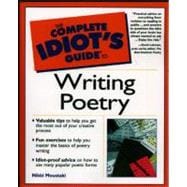
Note: Supplemental materials are not guaranteed with Rental or Used book purchases.
Purchase Benefits
What is included with this book?
Nikki Moustaki holds an M.A. in creative writing/poetry from New York University and an MFA in the same from Indiana University. She is the recipient of a 2001 National Endowment for the Arts Grant in poetry. Nikki has taught both poetry and fiction writing at New York University and Indiana University, as well as fiction, memoir, and poetry writing at the Gotham Writers' Workshop in New York City. Her publishing credits include Quarterly West, Cream City Review, Alaska Quarterly, TriQuarterly, Spoon River Poetry Review, Many Mountains Moving, PIF Magazine, American Literary Review, Yemassee Review, Madison Review, Berkeley Poetry Review, Cimarron Review, and Yankee Magazine, among others. Nikki hosts the writing Web site http://www.4betteror4words.com, featuring writing services and interviews with contemporary poets. You can e-mail her at betterverse@aol.com for information on upcoming private workshops and poetry critique.
| Part 1: What Is Poetry and How Do I Write It? | 1 | (50) | |||
|
3 | (14) | |||
|
|||||
|
17 | (16) | |||
|
|||||
|
33 | (10) | |||
|
|||||
|
43 | (8) | |||
|
|||||
| Part 2: Opening the Stanza's Door: Entering Poetry | 51 | (62) | |||
|
53 | (10) | |||
|
|||||
|
63 | (12) | |||
|
|||||
|
75 | (12) | |||
|
|||||
|
87 | (14) | |||
|
|||||
|
101 | (12) | |||
|
|||||
| Part 3: Popular Types of Poems and How to Write Them | 113 | (92) | |||
|
115 | (14) | |||
|
|||||
|
129 | (16) | |||
|
|||||
|
145 | (10) | |||
|
|||||
|
155 | (14) | |||
|
|||||
|
169 | (18) | |||
|
|||||
|
187 | (18) | |||
|
|||||
| Part 4: Poetry and Practicality | 205 | (124) | |||
|
207 | (14) | |||
|
|||||
|
221 | (10) | |||
|
|||||
|
231 | (10) | |||
|
|||||
|
241 | (18) | |||
|
|||||
|
259 | (14) | |||
|
|||||
|
273 | (20) | |||
|
|||||
|
293 | (12) | |||
|
|||||
|
305 | (24) | |||
|
|||||
| Appendixes | |||||
|
315 | (8) | |||
|
323 | (6) | |||
| Index | 329 |
The New copy of this book will include any supplemental materials advertised. Please check the title of the book to determine if it should include any access cards, study guides, lab manuals, CDs, etc.
The Used, Rental and eBook copies of this book are not guaranteed to include any supplemental materials. Typically, only the book itself is included. This is true even if the title states it includes any access cards, study guides, lab manuals, CDs, etc.